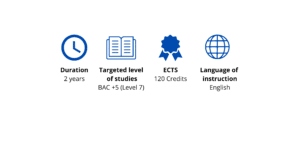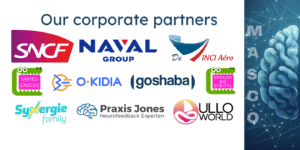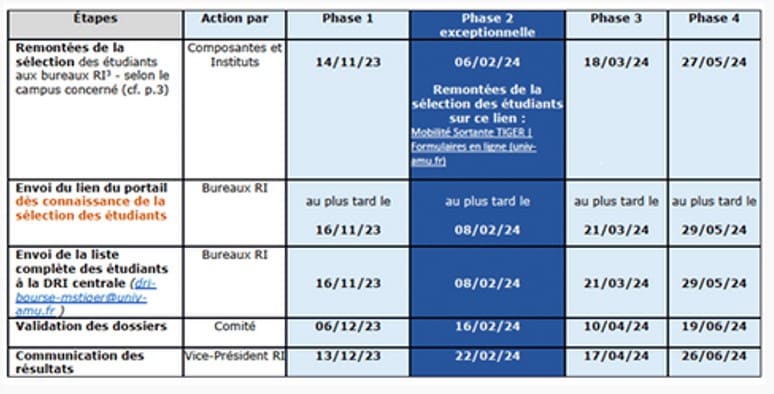Aix-Marseille Université – Supported by ILCB
Explore the science of the mind with a multidisciplinary approach
MaSCo is an innovative Master's program in Cognitive Science designed to offer students a rigorous scientific training in the study of human cognition. Taught entirely in English, the program combines theoretical knowledge with hands-on experience in cutting-edge methodologies.
Why choose MaSCo?
- An interdisciplinary and research-driven curriculum
- Access to advanced neuroimaging and computational tools
- Opportunities for internships in leading cognitive science labs
- Close ties to the ILCB, a major research consortium in France
- A dynamic academic environment in beautiful southern France
Program Overview
Summary presentation
MaSCo-Couse Syllabus-2024-2028
Application Guidelines-English version
Application Guidelines-French version
Program Coordination
- Program Heads: Marieke Longcamp & Noël Nguyen
- Track Coordinators:
- Language, Communication, and the Brain (LCB) – Kristof Strijkers
- Typical and Atypical Cognitive Functioning (TACF) – Marlène Abadie
- Internship Coordinator: Laurence Casini
- Educational Support: Lilia Mena
- Administrative Support: Nadéra Bureau
Link to amU website: Master Sciences Cognitives | sciences.univ-amu.fr


Presentation
MaSCo is an MA in Cognitive Science, delivered by Aix-Marseille University and supported by the Institute of Language, Communication and the Brain.
MaSCo provides an advanced scientific curriculum on human cognition, as well as a technological and methodological expertise in the evaluation, analysis and modeling of cognitive processes. Brain imaging technologies and computational methods are at the core of the MA.
The program provides advanced theoretical knowledge on the organization of the human mind, and the skills to analyze and model it.
Objectives
- Provide interdisciplinary academic knowledge on the functioning of the human mind.
- Allow students to understand and critically discuss the major theories and computational models in cognitive science.
- Provide the technical and methodological know-how needed to measure, analyze and model cognitive and neural functioning.
- Prepare for academic careers in cognitive science research.
- Train cognitive engineers.
Skills & knowledge
General skills and knowledge:
Design and develop a research approach in cognitive science.
Integrate transdisciplinary fundamental knowledge.
Mobilize fundamental knowledge from different disciplines in cognitive science.
Implement a research approach in a professional context.
Skills and knowledge specific to the Language, Communication, and the Brain (LCB) track:
- Integrate theoretical knowledge and fundamental techniques from cognitive science to understand the functioning of language and human
- Transfer the transdisciplinary knowledge acquired on language and human communication to develop and evaluate tools for studies on human-human and human-machine communication and language learning.
Skills and knowledge specific to the Typical and Atypical Cognitive Functioning (TACF) track:
- Integrate theoretical knowledge and fundamental techniques from cognitive science to understand typical and atypical cognitive
- Transfer the transdisciplinary knowledge acquired on typical and atypical cognitive functions to develop and evaluate technological tools in the fields of digital technology, health and education.
Course outline
https://amubox.univ-amu.fr/apps/onlyoffice/s/cK2L4LRWMdYwQX4?fileId=1607846372
Course syllabus
M2 Tracks
Track 1 : Language communication & the Brain
The track provides in-depth knowledge of the neural bases of language, communication, and dialogue, with highly interdisciplinary theoretical and methodological training in neurobiology of language, linguistics, psychology, neuroscience, computer science including automated language processing, and mathematics.
Track 2 : Typical & atypical functioning
The track provides in-depth knowledge of the various mental functions (perception, attention, decision-making, memory, reasoning, executive functions) and their neural bases in their typical and atypical functioning. The methods used are from cognitive psychology, psychophysics, cognitive and computational neuroscience.
Internships during M2
Framework
Students enrolled in the MaSCo program benefit from essential practical experience through two key internships. The first internship, lasting 120 hours, takes place during the first year of the program. This period allows students to gain initial immersion in the professional world. Subsequently, in the second year, students embark on a longer internship, totaling 500 hours. This extended period provides students with the opportunity to develop specialized skills, forge professional connections, and immerse deeply into their field of study.
Our partners
Internships are a vital component of our Master's degree program, offering diverse opportunities in both the private and public sectors. With access to cutting-edge research laboratories, our students have the chance to participate in exciting projects. Additionally, our extensive network includes partnerships with both SMEs and large enterprises such as SNCF, providing students with the chance to intern at national companies.

The pedagogical calendars indicate registration, teaching, and vacation periods, as well as exam dates.
You can consult them here: Calendriers | sciences.univ-amu.fr
Prerequisites
Le master est ouvert aux étudiants ayant acquis des compétences dans les licences disciplinaires suivantes :
- Licence de Sciences de la Vie
- Licence de Psychologie
- Licence d’Informatique
- Licence de Sciences du Langage ou Linguistique
- Licence de Mathématique
- Licence de Sciences et Humanités
- Licence Mathématique et Informatique Appliquées aux Sciences Humaines et Sociales
- Licence Mathématique Physique Chimie Informatique
If you hold another degree, but still wish to apply for the Master in Cognitive Science, you should contact the Program Heads to ensure that your application can be considered.
Application Procedures
Admission to the Master's program is subject to selection, both in the 1st year (after a bachelor's degree or BAC +3) and in the 2nd year (after a bachelor's degree or BAC +4).
Applications are made exclusively online. The procedure is different for European and non-European students, and among these, those who do or do not come under the“Études en France” procedure.
European students
European students are those with the nationality of one of the 27 countries of the European Union, one of the countries of the European Economic Area (EU + Norway, Iceland, Liechtenstein), Switzerland, Monaco or Andorra.
1.1 First-year applicants
For European students, or students outside the "Etudes en France" procedure, the application procedure is available on the Mon Master platform. https://www.monmaster.gouv.fr/
1.2 Second-year applicants
For European students, or students outside the "Etudes en France" procedure, the application is made on the Université d'Aix Marseille's eCandidats: https://candidatures.univ-amu.fr/candidatures/#!accueilView
Students concerned by the “Études en France” procedure
The following countries are involved in the "Etudes en France" procedure: Algeria, Argentina, Azerbaijan, Bahrain, Benin, Bolivia, Brazil, Burkina Faso, Burundi, Cambodia, Cameroon, Canada, Chile, China, Colombia, Comoros, Congo Brazzaville, Côte d'Ivoire, Djibouti, Ecuador, Egypt, Gabon, Georgia, Ghana, Guinea, Haiti, Saudi Arabia, South Africa, South Korea, United Arab Emirates, United States, India, Indonesia, Iran, Japan, Jordan, Kenya, Kuwait, Laos, Lebanon, Madagascar, Malaysia, Mali, Morocco, Mauritius, Mauritania, Mexico, Niger, Nigeria, Peru, Qatar, Democratic Republic of Congo (DRC),Russia, Senegal, Singapore, Taiwan, Thailand, Togo, Tunisia, Turkey, Ukraine, United Kingdom, United States, Vietnam.
For further information, please contact the Campus France office closest to your place of residence.
2.1 First-year applicants
Students apply via the “Études en France” platform:
https://pastel.diplomatie.gouv.fr/etudesenfrance
2.2 Second-year applicants
Students apply via the Études en France platform too.
https://pastel.diplomatie.gouv.fr/etudesenfrance
Selection process
Admission to the M1 program is solely through application.
Admission to the M2 program depends on application, and candidates may be invited to participate in an interview with a panel of Master’s supervisors. If selected for an interview, the date will be communicated no later than one week before the scheduled interview. Subsequently, applicants will receive notification regarding the status of their application shortly after the interview, indicating whether it has been accepted, rejected, or placed on the waiting list. Notifications will be sent via the online platform through which the application was submitted.
Tuition fees, CVEC, Financial aid
For more information about these subjects, please consult amU’s website.Tuition fees, CVEC, Financial aid | Aix Marseille Université
Tuition Fees and Exemptions
Non-EU students are subject to differentiated tuition fees at French public universities. These fees must be paid each academic year at the time of administrative registration.
At Aix-Marseille University, partial exemptions from these fees may be granted under certain conditions, including based on nationality.
For up-to-date information on tuition fees, eligibility for exemptions, and the national regulatory framework, please consult the official AMU website: Differentiated fees for students from outside the European Union | Aix Marseille Université
Free mover
If you have been accepted into our Master's degree program, you may have access to scholarships provided by the French government or other companies and institutions.
 Bourses Eiffel
Bourses Eiffel
The Eiffel scholarship program, launched in January 1999 by the French Ministry of Foreign Affairs, is designed to support the international recruitment efforts of French higher education establishments, against a backdrop of increasing competition between developed countries to attract the best foreign students in Master's, engineering and doctoral programs.
Eligible fields:

Master's Level Application Procedure
Students interested in applying for a scholarship through Campus France must first check their eligibility criteria and application deadlines directly on the official Campus France website.
Please note that the Campus France procedure follows a strict calendar, so we strongly recommend checking deadlines early in the academic year.
Bourses Campus France
French public institutes and the Erasmus+ programme offer a large number of scholarships for foreign students to help them finance their studies in France and Europe.
Campus Bourses (Campus Scholarships) provides information on the scholarships offered to foreign students. The tool lists all of the assistance provided by the States (French and foreign), regional authorities, companies, foundations and institutes of higher education. Filter your search by nationality, field and level of studies to find the assistance that corresponds to your profile.
Outgoing mobility for international internships
Présentation
Given the significance of internships in our training, students in our Master's program have the opportunity to apply for the Tiger Outgoing Mobility Grants when they have an international internship project in mind.
The TIGER (Transform and Innovate in Graduate Education with Research) project, a winner of the France 2030 investment program, is one of 6 structuring projects at Aix-Marseille Université to support its strategy of transforming education, research and innovation.
The "TIGER Outgoing Mobility grants" program aims to enhance the international mobility of master's students (internships, field missions...).
Student selection
Student selection aims to reward the most deserving and committed students. The selection process is conducted collaboratively among the responsible parties of Institutes of establishment, components, and program coordinators. Following this process, Institutes of establishment transmit the list of selected students to their respective International Relations office.
Annual calendar & steps
2023-2024 calendar:

If you are interested in applying for this scholarship, please contact Lilia Mena for more information.
Information on internships abroad
Aix-Marseille University provides detailed guidelines for organizing and completing internships abroad:
Internships Abroad – AMU
Funding opportunities for international internships
Depending on each student’s situation, several grants and funding options are available through AMU:
Internship Grants – AMU
The events
The ILCB summer school
The Institute of Language, Communication and the Brain, of which the MaSCo forms the training branch at the Master’s level, holds an intensive, one-week summer school every year.
Further information at https://www.ilcb.fr/2024-2/
Réunions Alumni
Each year, we host an alumni reunion that brings together current MaSCo students and former graduates of the Master in Cognitive Sciences program. This annual event serves as a unique opportunity for networking, sharing experiences, and fostering connections between the next generation of cognitive scientists and those who have already ventured into the professional world. During the reunion, attendees can engage in discussions about recent developments in the field, explore potential career opportunities, and benefit from the collective wisdom of our diverse alumni network. We believe this gathering not only strengthens the MaSCo community but also enriches the professional and academic journey of all participants.
Annual Workshop
The Scientific Workshop is a vital component of the course syllabus, designed to achieve two main goals. Firstly, it aims to enhance students' understanding of key cognitive functions, including language, memory, cognitive control, and reasoning. Secondly, it provides students with hands-on experience in cognitive science research through direct engagement with researchers from various disciplines.
This workshop is instrumental in helping students develop essential skills, such as: gaining interdisciplinary insights into the workings of the human mind, participating in intellectual debates on diverse cognitive approaches, practicing rigorous scientific methodologies, and improving their ability to communicate effectively in English.
Link to the 2024 Workshop : https://mascoconf2024.sciencesconf.org/
Research component
The best dissertations/mémoires
- Angelica Gutierrez Cisneros (Promo 2023)
The Social N400, how and where does it come from? An EEG pilot study. Cognitive science. 2023. ⟨dumas-04347635⟩
- Ambre Balleroy (Promo 2023)
Using naturalistic speech EEG recordings to test the cognitive reality of representations suggested by a Computational model of early phonetic learning. Cognitive science. 2023. ⟨dumas-04347612⟩
What to do after completing the MaSCo?
Our Master's program aims to prepare students for roles as cognitive engineers as well as for careers in cognitive science research. Professional opportunities are numerous, ranging from research to higher education, including digital communication, user experience (which involves understanding user behavior and their needs and motivations), marketing (such as customer satisfaction measurement and product evaluation), education (with the development of pedagogical and educational tools), and healthcare (including the development of diagnostic and remediation tools).
Furthermore, students who have completed this Master's program can pursue further studies in a Doctorate in Cognitive Science, as well as in Computer Science, Mathematics, Neuroscience, Psychology, or Linguistics.
